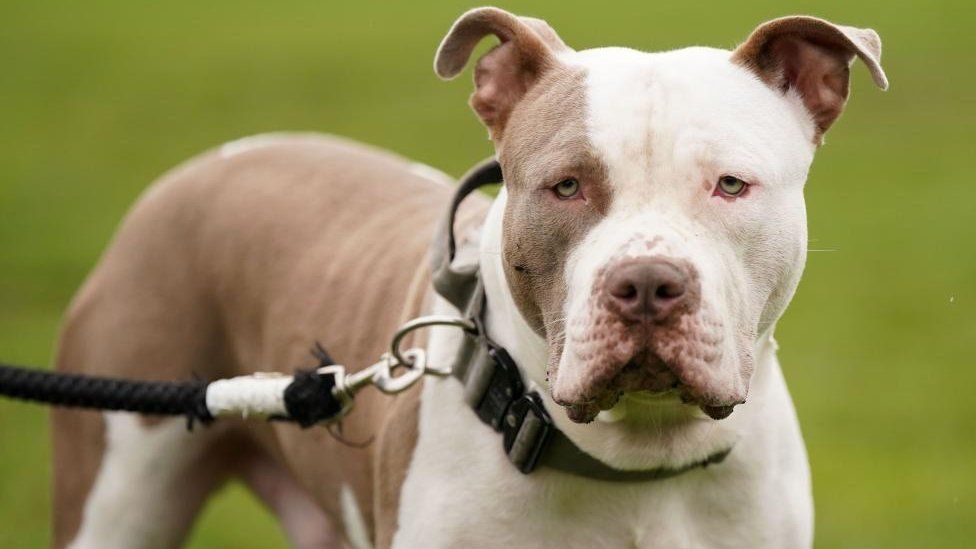What is an American XL bully and why are they being banned?
- Published

Rules restricting ownership of American XL bully dogs are in force in England, Wales and Scotland.
Owners in Northern Ireland will have to meet stricter requirements later in 2024.
What is an American XL bully?
An XL bully is the largest kind of American bully dog. Other types include standard, pocket and classic.
The UK government published guidance to help identify XL bullies, which are not recognised as a specific breed.
They are described as large dogs "with a muscular body and blocky head, suggesting great strength and power for [their] size".
Male XL dogs stand from 20in (51cm) high at the shoulder, with female XLs only slightly smaller.
Dogs will be considered XLs if they meet the minimum height and a substantial number of other characteristics.
How does the American XL bully ban work in England and Wales?
Ownership of American bully XL dogs is restricted under the Dangerous Dogs Act 1991.
Since 31 December 2023, it has been against the law to sell, give away, abandon or breed from an XL bully.
Since 1 February 2024, it has been a criminal offence to own an XL bully without an exemption certificate.
The government told the BBC it had received 61,000 applications for exemption before the deadline.
Police can seize unregistered prohibited dogs, and their owners face a criminal record and unlimited fine.
What do owners of exempt XL bullies have to do?
Owners in England and Wales who applied for an exemption had to buy insurance, microchip their dog and pay a £92.40 fee per animal.
Registered dogs must be housed securely, and kept on a lead and muzzled in public.
Older dogs must also be neutered by 30 June, or by the end of 2024 for dogs under the age of one.
Owners in England and Wales can no longer apply to exempt an XL bully.
Anyone choosing not to keep their XL bully had to take it to a registered vet to be euthanised by 31 January 2024.
What are the rules for American XL bullies in Scotland?
Since 23 February, American XL bullies must be muzzled and kept on a lead in public in Scotland.
It is illegal to abandon, rehome, sell, buy, or transfer ownership of an XL bully.
Anyone who breaks the rules risks up to six months in prison and/or a fine of up to £5,000.
Owners who wish to keep their dogs will need to have - or have applied for - an exemption certificate by 31 July 2024.
Details of how to register a dog will be released ahead of the deadline.
The requirements for exempt XL bully owners in Scotland are expected to mirror those in England and Wales.
There was an influx of dogs being rehomed north of the border before the England and Wales ban took effect.
What are the rules for American XL bullies in Northern Ireland?
People who wish to keep an XL bully will have to register their dog.
Owners will be subject to many of the restrictions in place in the rest of the UK:
- dogs must be neutered, and muzzled and kept on a lead in public
- it will be illegal to breed, abandon, rehome, sell, buy, or transfer ownership of XL bullies
It is not clear when the new requirements will take effect, but it is thought that the necessary legislation could be introduced in the summer or early autumn.
How dangerous is the American XL bully and how many attacks have there been?
There are no official statistics on attacks by individual dog breeds in the UK.
The BBC sent Freedom of Information requests to every local police force in England and Wales.
The responses showed police forces recorded 30,539 offences of an out-of-control dog causing injury to a person or guide dog in 2023 - a 21% increase from the 25,291 recorded in 2022.
Devon and Cornwall Police recorded the largest percentage increase in attacks, up 51% from 662 in 2022 to 1,002 in 2023.
Your device may not support this visualisation
When it announced the XL bully ban in England and Wales in late 2023, the government said 23 deaths had been caused by dog attacks since the start of 2021, "with the XL bully being disproportionately involved".
In several cases, XL bullies have killed their owners or bystanders, including 68-year-old Esther Martin, 54-year-old Ian Langley, 52-year-old Ian Price, 65-year-old Ann Dunn, 17-month-old Bella-Rae Birch and 10-year-old Jack Lis.
Why do some charities oppose the American XL bully ban?
Breed-specific bans do not work and are unfair on responsible dog owners and their pets, according to the Dog Control Coalition.
The body includes Battersea Dogs and Cats Home, the Dogs Trust, the Kennel Club, the RSPCA and the British Veterinary Association.
The group wants a complete overhaul of the Dangerous Dogs Act, including tougher penalties for owners who fail to control their dogs.
Which other breeds are banned under the Dangerous Dogs Act?
Four other breeds are banned in the UK under the Dangerous Dogs Act 1991:
- the American pit bull terrier
- the Japanese tosa
- the Dogo Argentinos
- the Fila Brazileiro
BBC reporter Jordan Davies asks experts why the ban on the American XL bully dog is controversial and what impact it is likely to have.